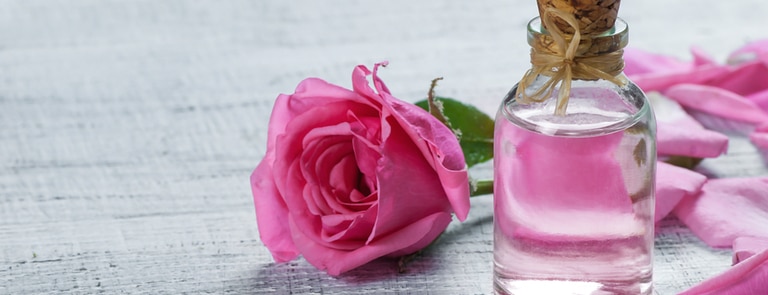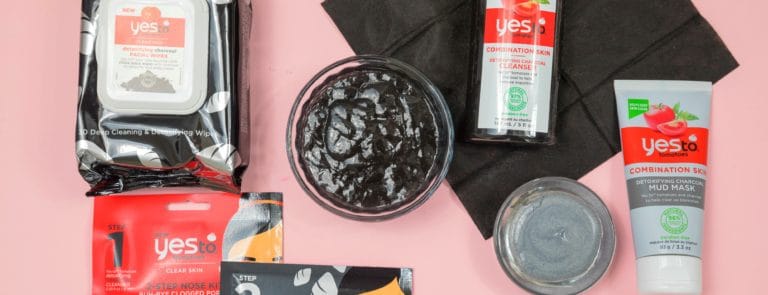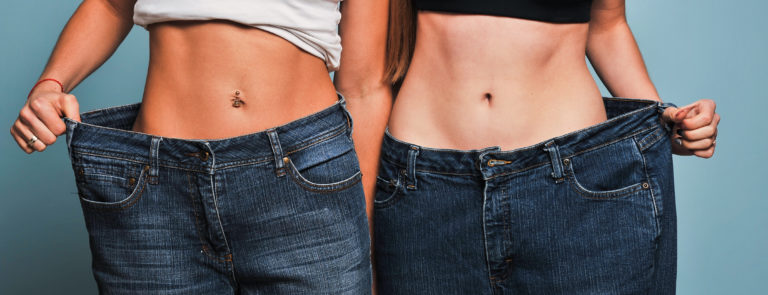15% off £40
The benefits of rose water

Rosewater is thought to be one of the oldest beauty products on the planet. Long before roses were cultivated in gardens, wild roses were used to make rosewater.
Legend has it that rosewater was invented when petals fell into a fountain at an ancient royal wedding. As the sun heated the water, the rose petals released a wonderful perfume once the oils were released. The princess dabbed the droplets onto her skin, and the association with beauty began.1
Rosewater was equally as popular in the Roman Empire, with fountains and public baths overflowing with petals. One story even suggests that Emperor Nero had pipes installed to sprinkle his guests with rosewater during a dinner party.2
Historically, rosewater was prized for its floral fragrance. Today, we use rosewater for a range of reported health and skincare benefits. But is it worth the hype? We’ve got everything you need to know below.
What is rosewater?
Rosewater is made by distilling or simmering rose petals in water. This process departs the petals’ fragrance and oils into the water, leaving an infusion behind.3
It’s possible to make rosewater at home, although it’s best to use certain types of rose petals to get the best result. You can also buy commercial rosewater, as well as products that contain it along with other ingredients.4
Rosewater benefits
While rosewater may still be prized for its gentle fragrance, there is a range of reported beauty benefits that may work for your skincare routine.
Some rosewater benefits might include:
- Reduced redness5
- Soothing effect6
- Refresh and plump skin7
- Helps even skin tone8
- Moisturisation9
- Enhanced mood10
Like with any skincare product, proceed with caution. If you notice any irritation, stop using your rosewater product immediately and seek professional advice. Nevertheless, rosewater is considered safe to use for most skin types.11
Rosewater is a common ingredient in specific recipes too. If you plan to use rosewater in your cooking or drink preparation, watch out for any unwanted symptoms after eating and drinking.
Ways to use rosewater
Whether you choose a pre-made product or try making it at home, there are plenty of ways to use rosewater.
You could try using pure rosewater in the following ways:
- As a skin toner
- As a refreshing spray or mist
- As a light, perfume
- Mixed into your favourite creams
- Mixed with oils as moisturising treatments12
- In cooking and baking13
- Mixed into smoothies and teas14
If you buy pure rosewater and plan to use it in drinks or food, remember to check that your chosen product is safe to consume.
You may also want to look for face care products or other beauty items that include rosewater as an ingredient. Many manufacturers take advantage of all the reported rosewater benefits by having it in their beauty products. You’ll be able to find serums, mists, masks, creams, toners, cleansers, and much more that include rosewater as an ingredient.15
Last updated: 5 April 2021
- https://www.byrdie.com/benefits-rosewater-drink
- https://perfumesociety.org/history/the-romans-when-rosewater-flowed-through-fountains/
- https://www.thespruceeats.com/homemade-rose-water-and-rose-oil-1805691
- https://www.stylecraze.com/articles/diy-make-rosewater-at-home/
- https://www.ncbi.nlm.nih.gov/pmc/articles/PMC3586833/
- https://www.ncbi.nlm.nih.gov/pmc/articles/PMC3661513/
- http://www.amis.pk/files/PrefeasibilityStudies/SMEDA%20Rose%20Water.pdf
- https://onlinelibrary.wiley.com/doi/full/10.1002/fsn3.870
- https://www.byrdie.com/benefits-rosewater-drink
- https://www.ncbi.nlm.nih.gov/pmc/articles/PMC3586833/
- https://www.ncbi.nlm.nih.gov/pmc/articles/PMC3586833/
- https://www.stylecraze.com/articles/diy-make-rosewater-at-home/
- https://www.bbc.co.uk/food/rosewater
- https://www.byrdie.com/benefits-rosewater-drink
- https://food.ndtv.com/beauty/10-benefits-of-rose-water-you-need-to-know-1239785













